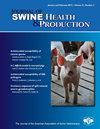Development of a herd-specific lung homogenate for exposure to Mycoplasma hyopneumoniae under field conditions
IF 0.7
4区 农林科学
Q3 Agricultural and Biological Sciences
引用次数: 9
Abstract
The swine industry is known for holding high standards of disease control and elimination. However, partial disease control for Mycoplasma hyopneumoniae at the farm level has been evident and has driven initiatives for unconventional health management strategies. Several approaches focused on gilt exposure for M hyopneumoniae using a herd-specific lung homogenate have been performed in the field. Nevertheless, variations in efficacy are apparent and a publicly available protocol for producing M hyopneumoniae lung homogenate under field conditions is not available. In this practice tip, a protocol is described for developing a herd-specific lung homogenate for M hyopneumoniae exposure intended for use in veterinary-supervised elimination or control programs. A herd-specific lung homogenate inoculum, free of secondary respiratory pathogens for the herd of intended use and with an adequate M hyopneumoniae concentration, was obtained through extensive diagnostic testing and evaluation of M hyopneumoniae localization within the lung. Molecular methods were applied to characterize the M hyopneumoniae present in the lung and to evaluate the genomic stability of the bacterium during the exposure process. In doing so, a herd-specific M hyopneumoniae lung homogenate for gilt acclimation was obtained under field conditions.开发一种在野外条件下暴露于肺炎支原体的群体特异性肺匀浆
养猪业以控制和消除疾病的高标准而闻名。然而,在养殖场层面对肺炎支原体的部分疾病控制已经很明显,并推动了非常规健康管理战略的倡议。几种方法集中在猪肺炎支原体暴露使用畜群特异性肺匀浆已在现场进行。然而,疗效的差异是明显的,并且没有在野外条件下生产肺炎支原体肺匀浆的公开方案。在这个实践技巧中,描述了一种方案,用于开发猪肺炎支原体暴露的群体特异性肺匀浆,用于兽医监督的消除或控制计划。通过广泛的诊断测试和肺内肺炎支原体定位评估,获得了一种特定于猪群的肺匀浆接种物,该接种物不含猪群的继发性呼吸道病原体,并具有足够的猪肺炎支原体浓度。应用分子方法表征肺中存在的肺炎支原体,并评估暴露过程中细菌的基因组稳定性。在此过程中,在野外条件下获得了一种用于后备猪驯化的畜群特异性肺炎支原体肺匀浆。
本文章由计算机程序翻译,如有差异,请以英文原文为准。
求助全文
约1分钟内获得全文
求助全文
来源期刊
CiteScore
1.80
自引率
0.00%
发文量
29
审稿时长
>36 weeks
期刊介绍:
The Journal of Swine Health & Production (JSHAP) is an open-access and peer-reviewed journal published by the American Association of Swine Veterinarians (AASV) since 1993. The aim of the journal is the timely publication of peer-reviewed papers with a scope that encompasses the many domains of applied swine health and production, including the diagnosis, treatment, management, prevention and eradication of swine diseases, welfare & behavior, nutrition, public health, epidemiology, food safety, biosecurity, pharmaceuticals, antimicrobial use and resistance, reproduction, growth, systems flow, economics, and facility design. The journal provides a platform for researchers, veterinary practitioners, academics, and students to share their work with an international audience. The journal publishes information that contains an applied and practical focus and presents scientific information that is accessible to the busy veterinary practitioner as well as to the research and academic community. Hence, manuscripts with an applied focus are considered for publication, and the journal publishes original research, brief communications, case reports/series, literature reviews, commentaries, diagnostic notes, production tools, and practice tips. All manuscripts submitted to the Journal of Swine Health & Production are peer-reviewed.

 求助内容:
求助内容: 应助结果提醒方式:
应助结果提醒方式:


